 As women get older, many find they are increasingly less interested in sex. This can happen for a variety of reasons, from health issues and hormonal changes to the stresses of work, relationships, and raising children. Understanding the causes of declining sexual health in older women can be a first step in finding ways to work with and accept changes that have come in this intimate area of life.
As women get older, many find they are increasingly less interested in sex. This can happen for a variety of reasons, from health issues and hormonal changes to the stresses of work, relationships, and raising children. Understanding the causes of declining sexual health in older women can be a first step in finding ways to work with and accept changes that have come in this intimate area of life.
Many studies on sexual health in older women have found a marked drop in interest in sexual relations as women age. According to a 2008 Chicago study, lack of interest in sex among older women is prevalent. It found that 45.5 percent of women between the ages of 57 and 64 are reportedly not interested in sex. Meanwhile, 37.6 percent of women from age 65 to 74, and 49.3 percent of women from age 75 to 85, have also expressed disinterest in sex.
In some cases, this lack of interest in sex can be due to issues with sexual health in older women. Persistent problems in sexual desire, response, pain, or orgasm among women are medically recognized as female sexual dysfunction (FSD). Aside from affecting a woman’s sexual satisfaction, FSD can also affect intimate relationships. This can cause a strain in the relationship and, ultimately, become a source of stress that, in turn, decreases sexual desire.
There are a number of common factors that can also cause an older woman to become disinterested in sex. These include:
 Many women feel pressured to match stereotypical expectations concerning sexual behavior. This can result in a sense that the frequency, quality, or conditions of sex should meet up to a certain standard that may not be right for an individual woman or couple. This can create additional pressure, expectations, or need for negotiation that prevents many women from wanting to deal with sex.
Many women feel pressured to match stereotypical expectations concerning sexual behavior. This can result in a sense that the frequency, quality, or conditions of sex should meet up to a certain standard that may not be right for an individual woman or couple. This can create additional pressure, expectations, or need for negotiation that prevents many women from wanting to deal with sex.
Sometimes, sexual health in older women can become compromised as a result of an underlying medical condition. These include high blood pressure, diabetes, arthritis, and coronary artery disease. However, even relatively mild conditions like hormone imbalances, insomnia, gaining weight, feeling tired, or early stage adrenal fatigue can affect your ability to feel aroused and satisfied.
This is the kind of stress that everyone tends to experience regularly. Sources of this type of stress include finances, work, studies, relationships, career, and many others. It can be emotional, environmental, or physiological. In other words, it can also come from inside your body, due to health issues or lifestyle factors. And this type of stress over the long-term can affect your entire life.
 Typically, when the body needs to respond to stress, it activates its NeuroEndoMetabolic (NEM) Stress Response system. This system is composed of six circuits of organs and systems that work together to address stress. Once the stress has passed, all of the organs in the NEM system need to return to normal function. However, when stress continues to persist and becomes chronic, these systems can become overworked.
Typically, when the body needs to respond to stress, it activates its NeuroEndoMetabolic (NEM) Stress Response system. This system is composed of six circuits of organs and systems that work together to address stress. Once the stress has passed, all of the organs in the NEM system need to return to normal function. However, when stress continues to persist and becomes chronic, these systems can become overworked.
In the hormone circuit, consisting of the reproductive organs, the thyroid, and the adrenal glands, the adrenals work to produce the stress hormone cortisol in response to stress. Under chronic stress, the body favors the production of cortisol over other hormones, depriving it of the necessary sex hormones it needs for healthy reproductive function. Research has shown a direct correlation between stress and decreased levels of arousal, desire, and satisfaction in women.
Eventually, the adrenals can no longer keep up with the production demands of chronic stress, resulting in Adrenal Fatigue Syndrome (AFS). One of the symptoms of AFS that many suffer from is reduced sex drive. If a disinterest in sex is a source of stress, this can create a feedback loop, worsening both stress and sexual health.
Most women experience a decline in the sex hormones estrogen and progesterone as they get older. There is a 75 percent reduction of progesterone in women’s bodies between the ages of 35 and 50. Meanwhile, there is a 35 percent decline in estrogen during this period. If these hormones decline at imbalanced rates, it can create too much of one, leading to hormone imbalances. These hormone levels also decrease as women enter menopause. This also creates further hormonal imbalance and contributes to problems with sexual health in older women.
A decrease in estrogen and progesterone levels can lead to a decreased interest in sex. These low levels can also cause dry vaginal tissues. As a result, sex can become uncomfortable and even painful.

If sexual health issues are caused by medical issues or relationship difficulties, you may want to seek out professional help. There are many excellent doctors that specialize in women’s health, and many therapists can help you develop tools for and perspective on how you and your partner practice intimacy. Taking steps to resolve these issues could be a necessary part of improving your overall sexual wellbeing. If stress is a factor, trying stress reduction techniques like yoga, meditation, journaling, time with friends, and enjoying hobbies, is a great way to reduce stress.
If you’re interested in boosting your sexual health and libido, there are also many steps you can take. You’ll find that many of the remedies that seek to improve sexual health in older women are also for the most part remedies that boost your health overall. They increase blood flow, calm you, reduce oxidative stress, ensure you have enough nutrients, and encourage flexibility.
Making sure you are including these practices in your lifestyle is a great way to boost sexual health in older women as well as to boost overall health, quality of life, and longevity. With these, you can’t go wrong.

 There are many ways to improve sexual health in older women, but many of these ways involve discovering what the problem is in your individual case, and finding the right way to address it. Seeking out professional women’s doctors and therapists can be your best bet if you have medical challenges or relationship difficulties getting in the way of your sexual health. If you have been under chronic stress and suspect adrenal fatigue is preventing you from enjoying the sex life you want, it could be a good idea to seek out specialized adrenal fatigue coaching, as this complex condition is often one many doctors are unaware of. Finally, taking steps to care for your health overall, like exercising regularly, eating a balanced diet, and reducing stress in your life are great ways to improve your sexual health and happiness as well.
There are many ways to improve sexual health in older women, but many of these ways involve discovering what the problem is in your individual case, and finding the right way to address it. Seeking out professional women’s doctors and therapists can be your best bet if you have medical challenges or relationship difficulties getting in the way of your sexual health. If you have been under chronic stress and suspect adrenal fatigue is preventing you from enjoying the sex life you want, it could be a good idea to seek out specialized adrenal fatigue coaching, as this complex condition is often one many doctors are unaware of. Finally, taking steps to care for your health overall, like exercising regularly, eating a balanced diet, and reducing stress in your life are great ways to improve your sexual health and happiness as well.
When the body experiences stress, the adrenal glands respond by producing the primary stress hormone cortisol. And as stress persists, the body continues to prioritize the production of cortisol over other hormones, including essential sex hormones. This reduced output can negatively affect sexual health in older women.
